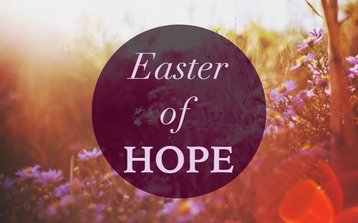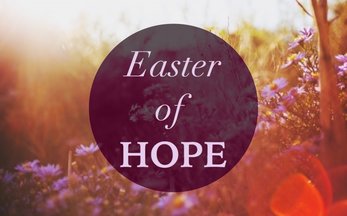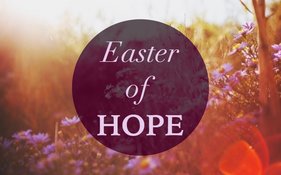|
Fr. John Gordon is presently the Associate to Vicar for Pastoral Life, Coordinator of Office for Evangelization, and the Coordinator for Charismatic Renewal for the Archdiocese of Newark, NJ. All content is created by "Array of Hope". If you would like to directly receive all of the content created by this ministry you can sign up at www.arrayofhope.net
0 Comments
Today's Gospel Matthew 28:1-10 After the sabbath, as the first day of the week was dawning, Mary Magdalene and the other Mary came to see the tomb. And behold, there was a great earthquake; for an angel of the Lord descended from heaven, approached, rolled back the stone, and sat upon it. His appearance was like lightning and his clothing was white as snow. The guards were shaken with fear of him and became like dead men. Then the angel said to the women in reply, "Do not be afraid! I know that you are seeking Jesus the crucified. He is not here, for He has been raised just as He said. Come and see the place where He lay. Then go quickly and tell His disciples, 'He has been raised from the dead, and he is going before you to Galilee; there you will see Him.' Behold, I have told you." Then they went away quickly from the tomb, fearful yet overjoyed, and ran to announce this to His disciples. And behold, Jesus met them on their way and greeted them. They approached, embraced his feet, and did him homage. Then Jesus said to them, "Do not be afraid. Go tell my brothers to go to Galilee, and there they will see me." Reflection The first few days after a great tragedy are always marked with a profound silence, but a silence that feels incredibly empty, like a void. There may be chaos all around, but inside of the one feeling grief, there is a silent absence. As the women approached the tomb, they were probably silent, feeling incredibly empty, a void where Jesus’ presence used to be. It was only a “great earthquake” that shook them from their sorrow; the second earthquake since the one that had signified Jesus’ death. An angel appears, the earth shakes, the guards pass out in terror, but the women are told not to be afraid. The angel announces that Jesus is alive and Scripture says that, “they went away quickly from the tomb, fearful yet overjoyed, and ran to announce this to his disciples.” Grief becomes amazement, sorrow becomes joy. God literally shook them out of their mourning and filled them with cause to rejoice. Like the two women, none of us can escape the pain of grief and sorrow in our lives. Loss is like a “great earthquake”. It completely shakes up our lives. Nothing remains the same after an earthquake; the ground takes on a new dimension. Loss, pain, tragedy, and suffering are a part of our experience in this broken world, but in the Resurrection story we find evidence of how God confronts us in our loss and offers us hope and redemption. The reaction of the guards and the women to the angelic presence represent the two ways we can approach tragedy. There are those who face grief with anger, trying to guard and defend what little they feel they have left, not reaching out to God in any way. When confronted with God’s grace and desire to heal them, they harden their hearts, are overwhelmed, and “become like dead men”, insensible to God’s love. The women, however, trust in God. They remained with Jesus throughout His sufferings and came to render Him service even after His death. They could not see Him in their pain, but they believed He was somehow with them. When they met the angel, although it was difficult and caused them fear, they remained steadfast and were consoled in their sorrow. More than that, Jesus entered into their very experience and revealed Himself to them, and entrusted them with a mission to announce the good news of His Resurrection to others. Each of us has a choice when faced with suffering and grief: will we resist God, guarding ourselves from Him, and not allow Him into our pain and sorrow, or will we open our hearts and share our experience with Him? Those who trust in God will encounter Him on the path of life, in beautiful and difficult moments, and if we allow Him into our pain and sorrow, He will share with us the joy of His Resurrection. Once transformed by His Resurrection, He sends us out, like the women, to tell others that they, too, can see Him in their pain, if only they desire. Today, let us reflect on whether we approach grief like the guards or the women, for this will determine whether or not we are open to the joy of the Resurrection that we celebrate every Easter and which can break through the darkness of the deepest sorrow, if only we desire. All content is created by "Array of Hope". If you would like to directly receive all of the content created by this ministry you can sign up at www.arrayofhope.net
Reflection Today’s Gospel is set in a garden, the place where Jesus brought His disciples many times to teach them about the faith. It was in a garden that man first chose not to trust God, leading to our alienation from Him, and here we are, again, in a garden, a place Jesus’ disciples knew well, watching our redemption take place. For all the beauty and tragedy found in that place, the garden was a place of encounter. “Whom are you looking for?” Jesus asks the gathered crowd; they state His name. He replies with the Biblical name of God, “I AM”, not once, but three times - a Biblical sign of completeness and finality, that Jesus is completely God and His moment has finally arrived. Jesus turns to each of us today and asks the same question, “Whom are you looking for?” Are you looking for hope? I AM. Are you looking for life? I AM. Are you looking for healing? I AM. Are you looking for redemption? I AM. Are you looking for love? I AM. Are you looking for a relationship with Me? I AM looking for you, too. Saying prayers is not the same thing as praying. Practicing a religion is not the same thing as being religious. Checking a box next to “Christian” on a form is not the same thing as being a follower of Christ. Words and gestures are meaningless if they are not rooted in a personal relationship with Jesus that transforms our entire lives. Judas knew how to say prayers, how to keep religious traditions, and what label to give himself. He was, by all signs, a practicing Jew, but if he really knew and had a living relationship with the God of his ancestors, then when he asked God where he was in his life, he would have heard Jesus whisper back to him. “I AM here”, and that relationship would have changed everything for him. Our world is tired of casual Christianity. Today, be a living witnesses to the joy and hope found in a relationship with Christ. When the world asks, “Who actually follows this Jesus and is a Christian?” We should be able to turn to them, as Jesus did to the crowd, and echo His words with conviction, “I AM." All content is created by "Array of Hope". If you would like to directly receive all of the content created by this ministry you can sign up at www.arrayofhope.net
Reflection Rituals form the basis of almost every religion and Catholicism is no exception. Catholics believe that in the bread and wine of the Last Supper meal we find the True Presence of Jesus in a very real and meaningful way. Not a symbol, not a nice little prize for coming to church, but a living and dynamic sharing in the very life of Christ for those who receive. The ritual of the Eucharist held great significance for the early Christians for in this letter to the Corinthians, St. Paul is reminding them of Jesus’ words about the Eucharist. Since this letter was written somewhere between 53-57 AD, it's evidence that this belief in the Real Presence was something held by the early Christians, not a later invention of the Church. The Eucharist is the Presence of Jesus in a sacramental way through a ritual dating back to the Last Supper itself. What is Jesus trying to teach us through it? Jesus has a personal love for you and He does not want to be forgotten by you. He wants to remind you of that love day after day, Mass after Mass, Communion after Communion. In the Eucharist, the priest is literally handing you Jesus’ Heart, although you can usually only see it with the eyes of faith. In fact, wherever there have been Eucharist miracles where the Eucharist has become visible flesh and blood (and there have been many, all over the world), the consecrated bread always becomes heart tissue, and more significantly, tissue from a heart that has suffered. Google it. It's amazing. What does this mean? Jesus has suffered for love of us, and suffers to be loved by us. He gives us His Heart in the Eucharist and some of us consider it nothing more than a ritual cracker. Holy Thursday celebrates the great gift of the priesthood, which brings us the beautiful Presence of Jesus in the Eucharist. Today, attend a Holy Thursday service. It’s one of the most beautiful rituals of the entire Church year. Holy Thursday invites us to enter into the mystery of God’s love shown upon the Cross, in the Eucharist, and through the community. Do this in remembrance of Him. His Heart is waiting. All content is created by "Array of Hope". If you would like to directly receive all of the content created by this ministry you can sign up at www.arrayofhope.net
Reflection In today’s psalm first we hear of abandonment and suffering, then bitterness, and finally it ends with singing and praise. This Psalm reads like a commentary of Jesus upon the Cross. In the throes of His agony, Jesus is abandoned by all but a few, looked upon with contempt, rejected. Line by line we can imagine these words being in Jesus’ mouth. In His last moments, a soldier gives Jesus vinegar to drink, pausing the psalm, for now, and shortly thereafter He dies. Easter morning, Jesus’ joy breaks through the tomb, completing psalm, “See, you lowly ones, and be glad; you who seek God, may your hearts revive!” announcing to Mary Magdalene His Resurrection. In our lives, we will often pass through moments of abandonment, desolation, and suffering. Perhaps we can relate to the words of the psalmist, words of pain and sadness, but the pattern of the psalm reminds us of an essential truth: with every Calvary, comes Resurrection. God never allows us to endure a suffering from which He will not draw a greater good. If Jesus truly rose from the tomb, then our greatest enemy, death, no longer has power over us. Jesus frees us to live as people of hope, trusting in His promise of eternal life. All pain, all suffering is temporary, but the joy of those who know God is eternal. Today, offer your sufferings up to God and pray for more trust in the Lord. Let us renew our trust in the promise of hope found in this psalm and Easter. All content is created by "Array of Hope". If you would like to directly receive all of the content created by this ministry you can sign up at www.arrayofhope.net
Today's Gospel John 13:21-33 Reclining at table with His disciples, Jesus was deeply troubled and testified, "Amen, amen, I say to you, one of you will betray me." The disciples looked at one another, at a loss as to whom He meant. One of His disciples, the one whom Jesus loved, was reclining at Jesus' side. So Simon Peter nodded to Him to find out whom He meant. He leaned back against Jesus' chest and said to Him, "Master, who is it?" Jesus answered, "It is the one to whom I hand the morsel after I have dipped it." So He dipped the morsel and took it and handed it to Judas, son of Simon the Iscariot. After Judas took the morsel, Satan entered him. So Jesus said to him, "What you are going to do, do quickly." Now none of those reclining at table realized why He said this to him. Some thought that since Judas kept the money bag, Jesus had told him, "Buy what we need for the feast," or to give something to the poor. So Judas took the morsel and left at once. And it was night. When he had left, Jesus said, "Now is the Son of Man glorified, and God is glorified in Him. If God is glorified in Him, God will also glorify Him in Himself, and He will glorify Him at once. My children, I will be with you only a little while longer. You will look for me, and as I told the Jews, 'Where I go you cannot come,' so now I say it to you." Simon Peter said to him, "Master, where are you going?" Jesus answered him, "Where I am going, you cannot follow me now, though you will follow later." Peter said to Him, "Master, why can I not follow you now? I will lay down my life for you." Jesus answered, "Will you lay down your life for me? Amen, amen, I say to you, the cock will not crow before you deny me three times." Reflection The readings of Holy Week paint images of intimacy with Jesus contrasted with those who turn from His love. In this Gospel, Jesus is “deeply troubled” and is unburdening His heart to His disciples. He shares with them that one of them would eventually betray Him and everyone is confused by His words. Simon Peter, being the leader, signals to the beloved disciple, John, to try to find out who it is. John leans into Jesus’ chest, near His Heart, and asks the name of the betrayer. Taking a small bit of food from the Passover seder, Jesus dips it in salt water, a symbol of the tears shed by the Hebrews in slavery during their time in Egypt, and hands it to Judas. Judas accepts the sign of affliction, because he is already enslaved by his own prideful agenda and quickly departs the meal of intimacy with Christ. Perhaps Judas thought he was doing Jesus a favor by arranging His confrontation with the high priest and the Sanhedrin, but it's obvious from the story of the anointing at Bethany, and today’s story, that Judas did not really understand Jesus’ Heart. Had he invested time into building his relationship with Christ, and not just filling the money bag that is constantly referenced in relationship to him, perhaps the Holy Week story would have unfolded differently. If anything, we can learn from Judas that if we do not take time to stay near the Heart of Christ, like the beloved disciple, we will find ourselves taking the sufferings of life, symbolized by the morsel dipped in salt water, and use them as incentive to move away from the God who loves us even in moments of confusion and pain. Today, let us reflect on whether or not we have allowed our struggles to draw us closer to Christ. Jesus wants us to stay near Him, like the beloved disciples. Let us resolve to share everything with Him, even the struggles, so that He can feed us with His life rather than allowing ourselves to be fed by the bitterness of our struggles. All content is created by "Array of Hope". If you would like to directly receive all of the content created by this ministry you can sign up at www.arrayofhope.net
Today's Gospel John 12:1-11 Six days before Passover Jesus came to Bethany, where Lazarus was, whom Jesus had raised from the dead. They gave a dinner for Him there, and Martha served, while Lazarus was one of those reclining at table with Him. Mary took a liter of costly perfumed oil made from genuine aromatic nard and anointed the feet of Jesus and dried them with her hair; the house was filled with the fragrance of the oil. Then Judas the Iscariot, one of His disciples, and the one who would betray Him, said, "Why was this oil not sold for three hundred days' wages and given to the poor?" He said this not because he cared about the poor but because he was a thief and held the money bag and used to steal the contributions. So Jesus said, "Leave her alone. Let her keep this for the day of my burial. You always have the poor with you, but you do not always have me." The large crowd of the Jews found out that He was there and came, not only because of Him, but also to see Lazarus, whom He had raised from the dead. And the chief priests plotted to kill Lazarus too, because many of the Jews were turning away and believing in Jesus because of him. Reflection The oil Mary used to anoint Jesus is significant, which is why the Scripture explicitly names it: nard or spikenard. It is a small blue flower that really does not have much of a scent until it is crushed. When it is crushed, the essential oils from the spikenard plant release a very fragrant, incense like perfume which is prized for its medicinal qualities and used in worship. In this Gospel, Mary placed herself at the feet of Jesus, crushed as it were, by her desire to worship and love Him. In her worship, the perfume of her virtue is released, causing jealousy in the heart of Judas who tries to shame her into distraction from her focus on Jesus, but Jesus defends her. Like the spikenard, with which she anoints Him, Mary’s offering is beautiful and appreciated by Jesus. She is told to keep the oil for His burial, hinting that she would be one of the few to remain faithful to Jesus throughout His coming sufferings, whereas Judas would forget His Rabbi. Mary worshiped God first, and was strengthened in fidelity. Judas was focused on his responsibility with the money bag and lost sight of his relationship with God; worship would have helped him to remain steadfast. May we look at our own lives and ask ourselves the challenging question: Is our first priority our relationship with God or all the things we think we are doing in His name? Perhaps today we can reflect on where our focus lies, for if our hearts are rooted in Christ, all that we do will be, “filled with the fragrance of the oil” of our worship. All content is created by "Array of Hope". If you would like to directly receive all of the content created by this ministry you can sign up at www.arrayofhope.net
Sr. Margaret Wilhelm is a Salesian Sister of St. John Bosco who currently serves in Haledon, NJ as the Treasurer for their eastern USA province.She has taught young people in junior high and high school, served as a high school principal, and been part of the formation team for young women discerning their call to the Salesian Sisters. She has a Bachelor's in Mathematics from William Paterson College, NJ, and a Masters in Education (Catholic School Leadership) from Seton Hall University, NJ. All content is created by "Array of Hope". If you would like to directly receive all of the content created by this ministry you can sign up at www.arrayofhope.net
Today's Reading Ezekiel 37:23-28 No longer shall they defile themselves with their idols, their abominations, and all their transgressions. I will deliver them from all their sins of apostasy, and cleanse them so that they may be my people and I may be their God. My servant David shall be prince over them, and there shall be one shepherd for them all; they shall live by my statutes and carefully observe my decrees. They shall live on the land that I gave to my servant Jacob, the land where their fathers lived; they shall live on it forever, they, and their children, and their children's children, with my servant David their prince forever. I will make with them a covenant of peace; it shall be an everlasting covenant with them, and I will multiply them, and put my sanctuary among them forever. My dwelling shall be with them; I will be their God, and they shall be my people. Thus the nations shall know that it is I, the LORD, who make Israel holy, when my sanctuary shall be set up among them forever. Reflection “It is I, the Lord, who make Israel holy...” Ultimately, it is God who saves us through grace. Even the desire and ability to conform to grace is a grace! It is called prevenient grace. “No longer shall they defile themselves with their idols, their abominations, and all their transgressions. I will deliver them from all their sins of apostasy, and cleanse them so that they may be my people and I may be their God.” However, we cannot sit back and expect God to do all the work. As St. Augustine says, “God created us without our permission and He will not save us without our permission.” Lent is not over, if you struggled so far to do what your proposed to do, start anew right now! If you forgot or did not plan to do anything, decide now and begin again! If you failed every single day of Lent thus far in being patient with your boss, sibling, family member or friends, start again today! You can do it! You know why? Because of grace. God is giving you the grace to be patient, to make the decided sacrifice, to do x,y,z that you resolved to do this Lent. If it is not working out, then ask for the grace to respond to God’s grace. Show Him your willingness and He will overwhelm you with success. There is no reason to doubt our Father’s generosity for He says through Ezekiel, “My dwelling shall be with them; I will be their God, and they shall be my people.” If He choses to dwell with us, and if He chooses to be our God, and if He chooses to claim us as His own, then why would He not do everything to help us? We just have to ask. Today, ask for the grace to respond to all of the graces He wants to give you. All content is created by "Array of Hope". If you would like to directly receive all of the content created by this ministry you can sign up at www.arrayofhope.net
Today's Gospel John 10:31- 42 The Jews picked up rocks to stone Jesus. Jesus answered them, "I have shown you many good works from my Father. For which of these are you trying to stone me?" The Jews answered Him, "We are not stoning you for a good work but for blasphemy. You, a man, are making yourself God." Jesus answered them, "Is it not written in your law, 'I said, 'You are gods"'? If it calls them gods to whom the word of God came, and Scripture cannot be set aside, can you say that the one whom the Father has consecrated and sent into the world blasphemes because I said, 'I am the Son of God'? If I do not perform my Father's works, do not believe me; but if I perform them, even if you do not believe me, believe the works, so that you may realize and understand that the Father is in me and I am in the Father." Then they tried again to arrest Him; but He escaped from their power. He went back across the Jordan to the place where John first baptized, and there He remained. Many came to Him and said, "John performed no sign, but everything John said about this man was true." And many there began to believe in Him. Reflection In this Gospel, we see again the Jews accusing Jesus of blasphemy and we are reminded of the constant persecution that Jesus faced throughout His ministry. Jesus is our example of how to live out our faith. Living the faith means performing works maybe not miracles, but works of charity and courage in the face of opposition. Jesus repeatedly tried to explain to the people that He was sent from the Father, “the Father is in me and I am in the Father." But they refused to believe. Jesus did not need their belief or unbelief. His proof was in His works. Even if they didn’t believe His words when He said, "I am the Son of God", His miracles and works of God were undeniable. Although the leaders of the Jews were against Him, the common people began to believe Him and follow Him because they realized He was the fulfillment of the prophesy. May we look to Jesus as our ultimate example. May we not be afraid of standing up and fighting for our faith. Even if we are the only one. God see how we live out our faith and looks upon us with favor. Our reward will be great in Heaven. Much like Jesus, the crowds may not believe us and even the great leaders may not recognize the truth. However, we find rest in knowing that Jesus is "the way, the truth, and the life and whoever believes in Him will have eternal life" (John 3:15). Today, make an outward sign of your faith. Do not shy away from wearing a crucifix, a "Jesus T-shirt” or going against the tide over a controversial topic. Today, be an example of Jesus to others. All content is created by "Array of Hope". If you would like to directly receive all of the content created by this ministry you can sign up at www.arrayofhope.net
|
Lenten ReflectionsDaily reading and a Lenten reflection including tips on how to live out the hope of Christ's resurrection. ArchivesCategories
All
|
|
Parish Office
81 Cooper Street Woodbury, NJ Phone 856-845-0123 Office Hours: 9:00am - 4:00pm Monday-Friday Summer Hours: 9:00am-3:00pm Monday-Friday Email: [email protected] Click Here For Directions and Maps |





 RSS Feed
RSS Feed


